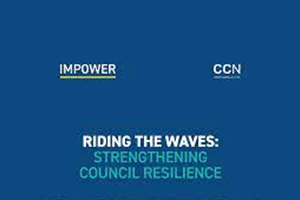‘Personal’ resilience has become an increasingly popular topic as a collection of apps, courses, training, wellness articles and mindfulness approaches have flooded the market. The pandemic of course heightened this trend, and these resources have been crucial to help people to deal with the impact of restrictions and lockdowns.
‘Organisational’ resilience however has not had the same level of focus, and this needs to change. We define organisational resilience as the ability to anticipate, adapt to and bounce forward from disruption. In IMPOWER’s book, The EDGEWORK Manifesto (published in late 2019, just before the pandemic hit) sets out that public sector systems are complex in nature, and subject to ongoing disruption.
It is our contention that the public sector can be well-prepared, or poorly prepared, to cope with these disruptive events, and that their ability to cope has very little to do with the amount of financial reserves available – although of course money does help. It is also IMPOWER’s belief that resilience can be deliberately invested in, and that the choice to do so (or not) is down to local leaders.
Of course, there is no statutory framework telling local leaders what to do. So, building on their EDGEWORK approach, during the autumn of 2020 IMPOWER decided to use the pandemic as a learning opportunity – to design, test and iterate a resilience framework with eight local authorities. As the biggest disruptive event in decades, it has been extremely revealing of the underlying strengths and challenges facing the sector.
IMPOWER’s Resilience Framework is designed specifically for public sector organisations managing large, complex systems where disruptions, small and large, occur all the time. It is grounded in academic research into what makes complex systems inherently resilient, and via some real-world testing and learning, they have translated this into a practical toolkit for leaders of local public services.
Visit their website to read more.

